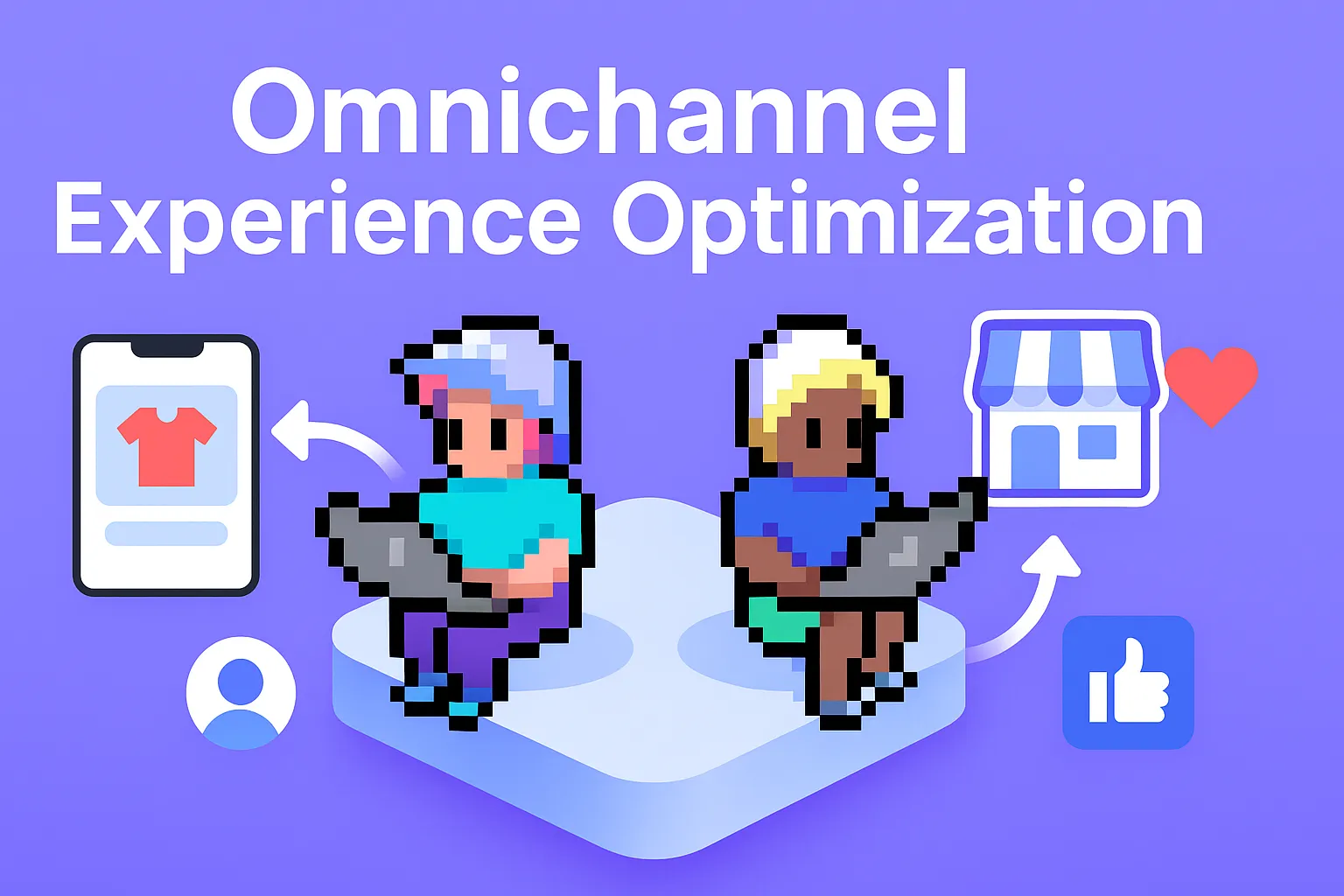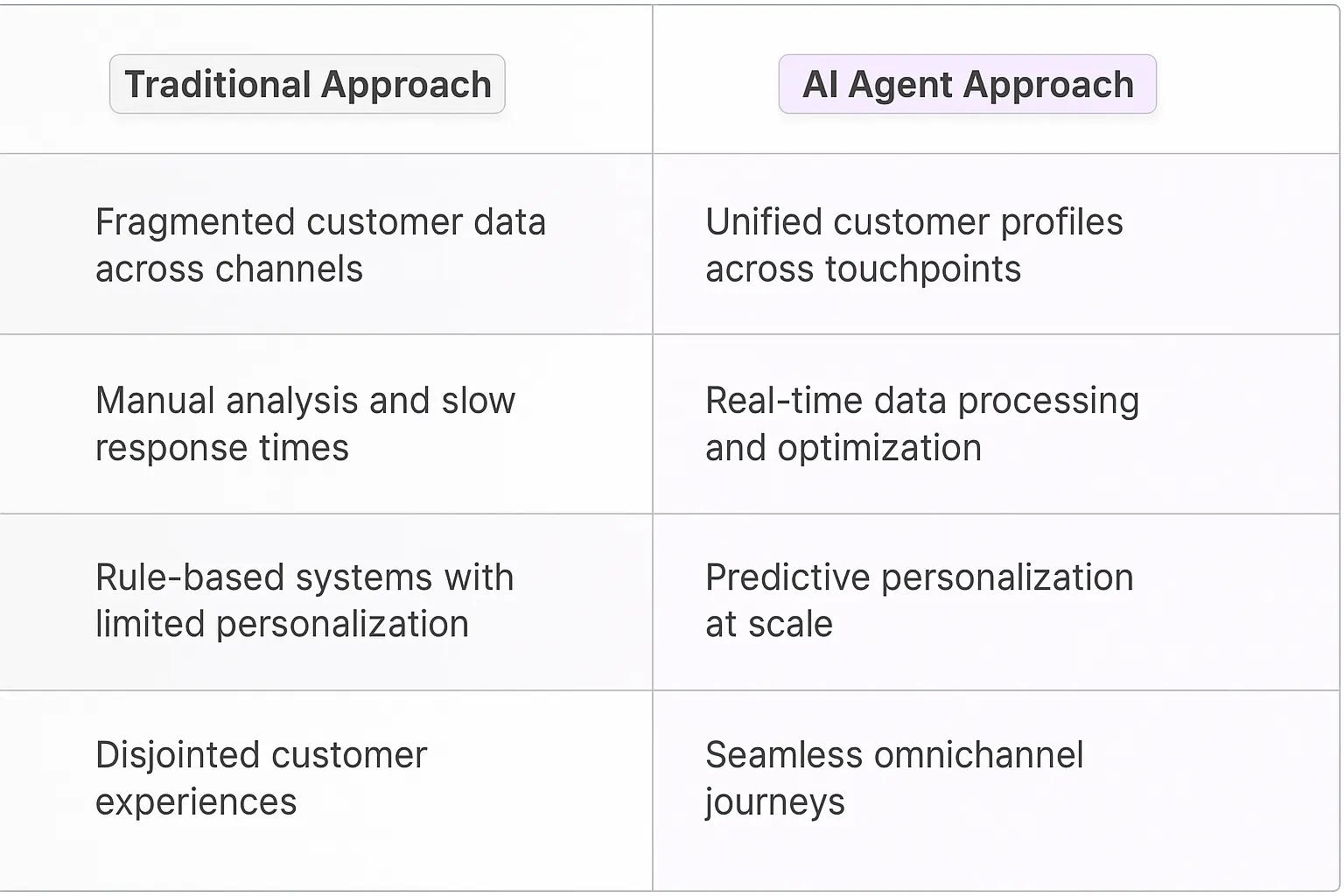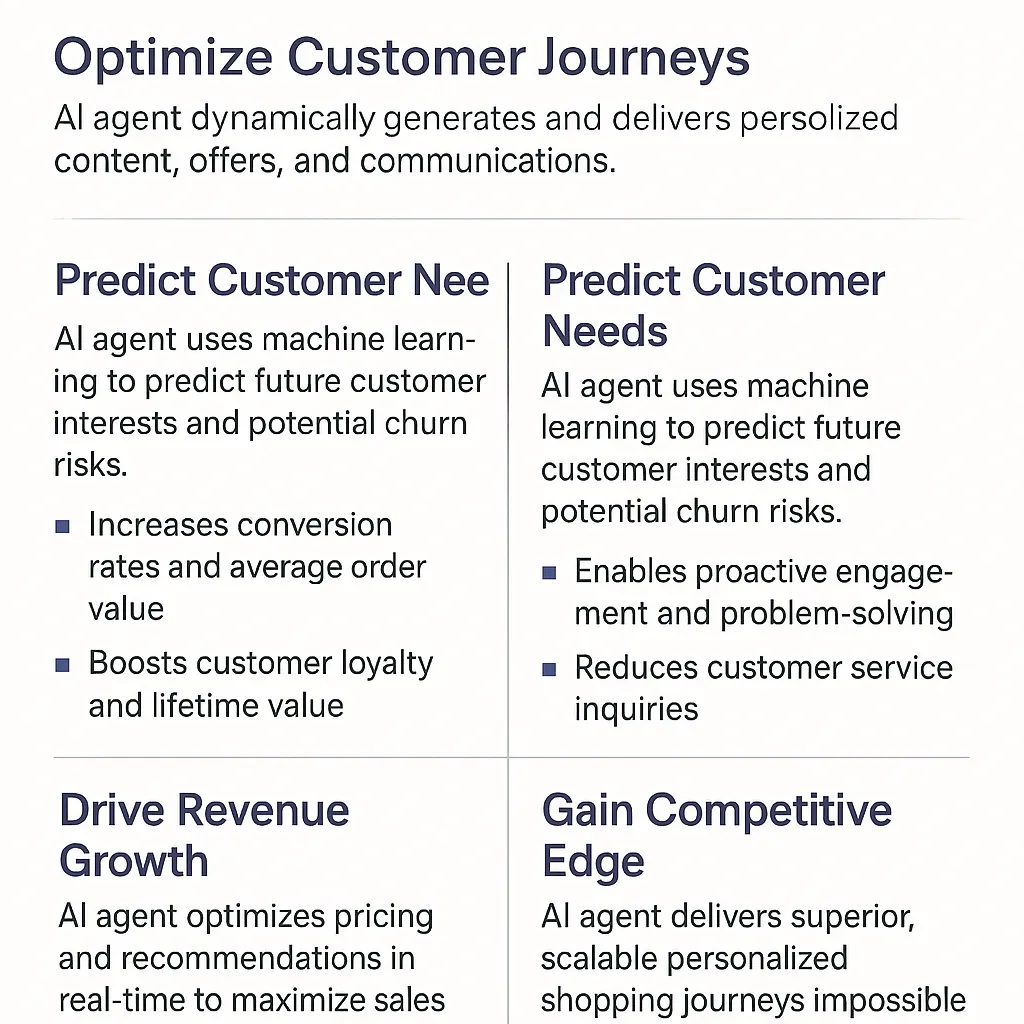Omnichannel Experience Optimization AI Agents
Defining and Optimizing the Omnichannel Customer Experience
Omnichannel experience optimization is the art and science of creating a cohesive, personalized customer journey across all touchpoints - digital and physical. It's about breaking down silos between channels and delivering a consistent, tailored experience whether a customer is browsing on mobile, chatting with support, or walking into a store. The goal? To make brand interactions feel like one continuous conversation, not a series of disjointed encounters.
Key Features of Omnichannel Experience Optimization
1. Seamless integration: All channels work together in harmony, sharing data and insights in real-time.
2. Personalization at scale: Every customer interaction is tailored based on their history, preferences, and context.
3. Predictive capabilities: The system anticipates customer needs and behaviors, allowing for proactive engagement.
4. Cross-channel consistency: Brand voice, messaging, and offerings remain coherent across all touchpoints.
5. Data-driven decision making: Insights from all channels inform strategy and optimize the customer journey.
6. Adaptive learning: The system continuously improves based on new data and interactions.
7. Omni-present customer profiles: A unified view of each customer that updates in real-time across all channels.

Benefits of AI Agents for Omnichannel Experience Optimization
What would have been used before AI Agents?
Before AI agents entered the scene, omnichannel experience optimization was a fragmented and labor-intensive process. Companies relied on a patchwork of tools and manual interventions to manage customer interactions across various channels. This often resulted in disjointed experiences, inconsistent messaging, and missed opportunities for personalization.
Teams would spend countless hours analyzing data from different touchpoints, trying to piece together a coherent customer journey. They'd use basic rule-based systems for rudimentary personalization and rely heavily on human intuition for decision-making. The result? Slow response times, scalability issues, and a general inability to keep up with the ever-increasing complexity of customer interactions.
What are the benefits of AI Agents?
AI agents are game-changers in the omnichannel optimization space. They bring a level of intelligence and adaptability that's transforming how businesses interact with customers across multiple platforms. Here's why they're so powerful:
1. Real-time personalization at scale: AI agents can process vast amounts of data in milliseconds, allowing them to tailor experiences on the fly. They're not just reacting to predefined rules; they're learning and adapting in real-time, creating truly personalized interactions for each customer.
2. Predictive insights: These digital teammates don't just respond to current situations; they anticipate future needs. By analyzing patterns and trends, AI agents can predict customer behavior and preferences, allowing businesses to stay one step ahead.
3. Seamless cross-channel consistency: AI agents excel at maintaining a coherent brand voice and customer experience across all channels. They ensure that whether a customer is on social media, a website, or in a physical store, the interaction feels part of a single, unified journey.
4. Continuous optimization: Unlike static systems, AI agents are always learning. They continuously refine their strategies based on new data, ensuring that your omnichannel approach evolves with changing customer preferences and market dynamics.
5. Enhanced efficiency: By automating complex decision-making processes, AI agents free up human teams to focus on high-value tasks that require creativity and emotional intelligence. This leads to more efficient resource allocation and improved overall productivity.
6. Data-driven decision making: AI agents provide deep, actionable insights that can inform strategic decisions. They can identify trends and opportunities that might be invisible to the human eye, helping businesses make smarter, data-backed choices.
7. Scalability: As your business grows, AI agents can easily scale to handle increased volume and complexity without a proportional increase in resources. This makes them particularly valuable for high-growth companies and enterprises dealing with massive customer bases.
The integration of AI agents into omnichannel experience optimization isn't just an incremental improvement—it's a fundamental shift in how businesses can understand and serve their customers. As these technologies continue to evolve, we're likely to see even more sophisticated applications that blur the lines between digital and physical experiences, creating truly seamless omnichannel journeys.

Potential Use Cases of AI Agents for Omnichannel Experience Optimization
Processes
Omnichannel experience optimization is a complex beast, and AI agents are the secret weapon to tame it. These digital teammates can revolutionize how businesses approach customer interactions across multiple touchpoints. Let's dive into some killer use cases:
- Real-time channel performance analysis: AI agents can continuously monitor and analyze the performance of each channel, identifying trends and anomalies that humans might miss. This allows for quick adjustments to optimize the customer journey.
- Predictive customer behavior modeling: By crunching vast amounts of data, AI agents can forecast customer preferences and behaviors across different channels, enabling businesses to proactively tailor their offerings and communications.
- Cross-channel content optimization: AI agents can analyze content performance across various channels and suggest optimizations to ensure consistency and effectiveness, regardless of where customers interact with the brand.
- Personalized omnichannel journey mapping: These digital teammates can create and update individual customer journey maps in real-time, considering interactions across all channels to provide a truly personalized experience.
Tasks
Now, let's break it down to the nitty-gritty tasks where AI agents can really flex their muscles:
- Automated sentiment analysis: AI agents can analyze customer interactions across channels to gauge sentiment, allowing for rapid response to negative experiences and amplification of positive ones.
- Dynamic pricing optimization: These digital teammates can adjust pricing strategies in real-time based on cross-channel data, competitor analysis, and individual customer behavior.
- Chatbot integration and enhancement: AI agents can seamlessly integrate chatbot interactions with other channels, ensuring consistent information and a smooth handoff to human agents when necessary.
- Inventory management across channels: By analyzing sales data and trends across all channels, AI agents can optimize inventory levels and distribution to meet demand efficiently.
- Personalized product recommendations: AI agents can leverage data from all customer touchpoints to provide hyper-personalized product recommendations, regardless of the channel.
- Cross-channel campaign performance tracking: These digital teammates can monitor and analyze marketing campaign performance across all channels in real-time, allowing for quick optimizations and budget reallocation.
The beauty of AI agents in omnichannel experience optimization is their ability to process and act on massive amounts of data in real-time. They're not just crunching numbers; they're orchestrating a symphony of customer interactions across channels, creating a cohesive and personalized experience that keeps customers coming back for more.
As businesses continue to grapple with the complexities of omnichannel strategies, AI agents will become indispensable allies in the quest for customer experience excellence. They're not replacing human creativity and intuition; they're augmenting it, allowing businesses to operate at a scale and level of personalization that was previously unimaginable.
The future of omnichannel experience optimization is here, and it's powered by AI agents. Those who embrace these digital teammates will find themselves lightyears ahead of the competition, delivering experiences that customers didn't even know they wanted – until now.

Industry Use Cases
AI agents are reshaping the landscape of omnichannel experience optimization across diverse sectors. Their ability to adapt and learn makes them indispensable for businesses aiming to create seamless, personalized customer journeys. Let's dive into some concrete examples that illustrate how these digital teammates are transforming industries and elevating customer experiences.
From retail to healthcare, financial services to hospitality, AI agents are becoming the unsung heroes behind the scenes, orchestrating complex interactions across multiple touchpoints. They're not just handling queries; they're anticipating needs, personalizing interactions, and bridging gaps between channels that once seemed insurmountable.
What's particularly fascinating is how these AI agents are evolving beyond simple task automation. They're now capable of understanding context, emotion, and intent, allowing them to navigate the nuances of human communication across various platforms. This level of sophistication is what's truly driving the next wave of omnichannel optimization.
In the following examples, we'll explore how different industries are leveraging AI agents to create cohesive, intelligent, and responsive omnichannel experiences that are redefining customer expectations and setting new standards for engagement.
Retail's Omnichannel Revolution: AI Agents as Personal Shopping Concierges
The retail industry is ripe for an omnichannel makeover, and AI agents are the perfect digital teammates to make it happen. Let's dive into how these AI-powered allies can transform the shopping experience from fragmented touchpoints to a seamless journey.
Picture a customer, Sarah, browsing winter coats on her favorite fashion retailer's mobile app. An AI agent, let's call it StyleSense, notices her browsing patterns and previous purchases. It doesn't just recommend products; it curates a personalized winter wardrobe that fits Sarah's style, budget, and local weather forecast.
As Sarah walks into a physical store, her phone pings. StyleSense has alerted the store's system, and a human sales associate is briefed on Sarah's online browsing history and preferences. The associate greets Sarah by name and guides her to a curated selection of coats she was eyeing online, along with complementary accessories.
While trying on coats, Sarah asks about a scarf she saw online but isn't in-store. The AI agent instantly checks inventory across all channels and arranges for the scarf to be shipped to Sarah's home, seamlessly blending the in-store and online experience.
Post-purchase, StyleSense doesn't go silent. It sends care instructions for Sarah's new coat, suggests outfits based on her wardrobe, and even predicts when she might need a replacement, triggering perfectly timed offers.
This isn't just about selling more stuff. It's about creating a shopping experience that feels magical, personal, and effortless across all channels. The AI agent acts as the invisible thread that ties together online browsing, in-store experiences, and post-purchase engagement into one cohesive journey.
The result? Increased customer loyalty, higher lifetime value, and a brand that feels less like a retailer and more like a personal style confidant. That's the power of AI-driven omnichannel optimization in retail.
Banking's Digital Transformation: AI Agents as Financial Life Coaches
The banking sector is undergoing a massive shift, and AI agents are at the forefront of this change. They're not just crunching numbers; they're becoming our financial confidants, available 24/7 across every touchpoint. Let's explore how these digital teammates are reshaping the banking experience.
Meet Alex, a young professional navigating the complexities of personal finance. Enter FinanceFlow, an AI agent that's about to become Alex's financial life coach. FinanceFlow doesn't just sit in a mobile app; it's omnipresent across Alex's financial journey.
When Alex checks their account balance on their smartwatch, FinanceFlow doesn't just display numbers. It provides context, comparing spending patterns to previous months and gently nudging Alex towards their savings goals. As Alex walks past a coffee shop, FinanceFlow sends a subtle reminder about the impact of daily lattes on their budget, all while respecting Alex's preferences and habits.
Later, as Alex browses homes on a real estate website, FinanceFlow springs into action. It analyzes Alex's financial health, credit score, and market conditions to provide real-time mortgage pre-approval estimates. It doesn't stop there – FinanceFlow schedules an appointment with a human mortgage specialist at Alex's local branch, ensuring a smooth transition from digital to in-person interaction.
During the branch visit, the mortgage specialist is already briefed on Alex's financial profile and property interests, thanks to FinanceFlow's seamless data integration. The conversation feels less like a sales pitch and more like a continuation of Alex's digital exploration.
Post-meeting, FinanceFlow takes charge of follow-ups. It sends personalized information about mortgage options, calculates potential repayments based on Alex's spending habits, and even suggests lifestyle adjustments to make homeownership more attainable.
This isn't just about selling financial products. It's about creating a cohesive, personalized financial ecosystem that adapts to the user's life. FinanceFlow acts as the connective tissue between mobile banking, online services, in-branch experiences, and even third-party financial tools.
The outcome? A banking experience that feels less transactional and more transformational. Customers like Alex gain a true financial partner that grows with them, understands their goals, and guides them across all channels. That's the game-changing potential of AI-driven omnichannel optimization in banking.
Considerations
Technical Challenges
Implementing an Omnichannel Experience Optimization AI Agent isn't a walk in the park. It's more like trying to juggle flaming torches while riding a unicycle on a tightrope. The technical hurdles are real, and they're not for the faint of heart.
First up, data integration. You're dealing with a mishmash of data sources - web analytics, mobile app usage, in-store behavior, call center logs - it's a data scientist's fever dream. Getting all these disparate systems to play nice is like herding cats. And not just any cats, but those snooty, aloof ones that look at you like you're beneath them.
Then there's the real-time processing challenge. Your AI agent needs to crunch through terabytes of data faster than a TikTok video goes viral. It's not just about speed; it's about making sense of the data tsunami in real-time to deliver personalized experiences across channels. One misstep, and you're serving up winter coats to customers lounging on tropical beaches.
Let's not forget about the AI model itself. Training a model that can understand and predict customer behavior across multiple touchpoints is like teaching a toddler quantum physics. It requires massive amounts of clean, labeled data - a resource as rare as a unicorn in Silicon Valley.
Operational Challenges
On the operational front, things get even spicier. You're essentially asking your organization to perform a complete digital transformation overnight. It's like asking a caterpillar to become a butterfly in 24 hours - possible in theory, but messy in practice.
Cross-departmental collaboration becomes crucial. Your marketing team, IT department, customer service reps, and even the folks manning the store counters need to be on the same page. It's like trying to get the Avengers to agree on where to order lunch - everyone has their own agenda and favorite shawarma joint.
Then there's the skills gap. Suddenly, you need a team of data scientists, machine learning engineers, and UX designers who understand the nuances of omnichannel experiences. Finding this talent is like searching for a needle in a haystack, except the haystack is on fire, and the needle is actually a specific piece of hay.
Privacy and compliance issues add another layer of complexity. With great data comes great responsibility. Navigating the labyrinth of data protection regulations across different regions is like playing a global game of regulatory whack-a-mole.
Lastly, there's the challenge of measuring success. In the omnichannel world, attribution becomes a tangled web. Was it the email campaign, the Instagram ad, or the in-store promotion that sealed the deal? Figuring this out is like trying to determine which raindrop caused the flood.
Implementing an Omnichannel Experience Optimization AI Agent is not for the faint-hearted. It's a high-stakes game that requires technical prowess, operational finesse, and a healthy dose of digital courage. But for those who can pull it off, the rewards are as sweet as finding an empty inbox on a Monday morning.
Embracing AI Agents: The Future of Omnichannel Experience
AI agents are not just enhancing omnichannel experience optimization; they're completely redefining it. These digital teammates are bridging the gap between data and action, enabling businesses to create truly seamless, personalized customer journeys at scale. From retail to banking, they're transforming how industries engage with customers, breaking down silos, and creating experiences that feel magical.
But let's not sugarcoat it - implementing these AI-powered systems is no cakewalk. The technical and operational challenges are real and formidable. It requires a perfect storm of data integration, real-time processing, cross-departmental collaboration, and a serious upgrade in digital skills.
Yet, for those who can navigate these choppy waters, the rewards are immense. We're talking about creating customer experiences that don't just meet expectations but blow them out of the water. It's about turning every interaction into an opportunity to delight, engage, and build lasting relationships.
As we look to the future, it's clear that AI agents will play an increasingly central role in omnichannel strategies. They're not just tools; they're becoming the invisible thread that ties together all aspects of the customer experience. For businesses ready to embrace this new paradigm, the possibilities are limitless. The question isn't whether to adopt AI-driven omnichannel optimization, but how quickly you can get on board before your competitors do.













